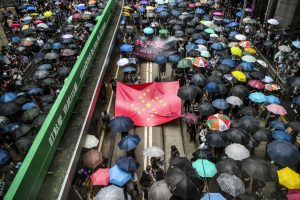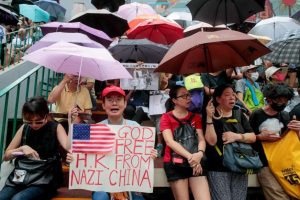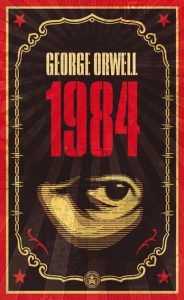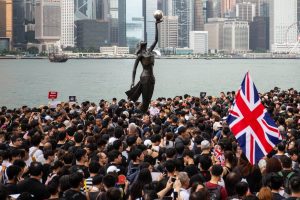
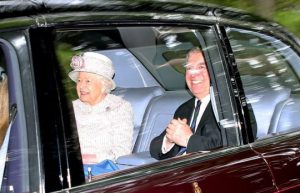



Anywhere but Victoria Harbor.
And now to 10 Downing Street NYC and the Chess Club.
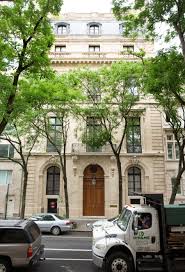
I wonder if everyone missed the 1984 part.
UK says 1984 Hong Kong rights treaty with China is as valid as ever
By Amanda Ferguson
Reuters.
July 2, 2019
* Hunt: We stand behind Hong Kong people
* Britain says China must abide by 1984 accord
BELFAST, July 2 (Reuters) – Britain expects China to abide by a 1984 treaty which guarantees basic freedoms to the former British colony of Hong Kong for 50 years, Foreign Secretary Jeremy Hunt told Reuters on Tuesday.
China has condemned violent protests in Hong Kong this week as a challenge to its rule after protesters stormed and trashed the territory’s legislature.
Millions have rallied against a bill which would have allowed people in Hong Kong to be extradited to the mainland to face trial in courts controlled by the Communist Party.
China and Britain signed a Joint Declaration in 1984 on the terms of the return of Hong Kong but Beijing has said the accord is a historical document with no practical significance.
Hunt told Reuters during a visit to Northern Ireland: “It is a legally binding document which has force for 50 years. Just as China expects other countries to follow their international legal obligations, the United Kingdom does the same.”
Hong Kong was returned by Britain to China in 1997 under a “one country, two systems” formula that allows freedoms not enjoyed in mainland China, including the right to protest and an independent judiciary.
China said on Monday Britain no longer has any responsibility for Hong Kong and should stop “gesticulating” about it.
When asked if China could be sanctioned for events in Hong Kong, Hunt said:
“I hope it won’t come up anything like that at all because there is a way through this which is for the government of Hong Kong to listen to the legitimate concerns of the people of Hong Kong about their freedoms.”
”… the U.K. stands by internationally binding treaties that we have signed with other countries and have continued to do so,” Hunt said. (Writing by Guy Faulconbridge; editing by Stephen Addison)
After Hong Kong Protests, everyone is talking about a 1984 Treaty
By: Gary Cheung
Clashes in Hong Kong over a contentious extradition bill have spilled to the diplomatic front.
British Foreign Secretary Jeremy Hunt on Tuesday warned that Beijing, which runs Hong Kong as a semi-autonomous region, would face serious consequences if it failed to honor a decades-old treaty.
The 1984 treaty, called the Sino-British Joint Declaration, paved the way for the former British colony’s return to Chinese control in 1997 in an arrangement under the framework of “one country, two systems.”
But demonstrations in recent weeks over the bill have exposed concerns that the firewall between the two systems is being eroded.
Here is what you need to know about the treaty that has come into renewed focus.
What is the Sino-British Joint Declaration?
It is an agreement signed by Britain and China in 1984 to settle the future of Hong Kong. The two governments agreed China would reassume control of Hong Kong, which was occupied by Britain after the Opium War in 1840, from July 1, 1997.
What are the main points of the joint declaration?
The treaty states that China’s basic policies regarding Hong Kong “will remain unchanged for 50 years,” including the promise that the city would retain a high degree of autonomy.
The basic policies are detailed in an annex and stipulated in the Basic Law, the city’s mini-constitution that was put into effect by the National People’s Congress in 1990.
The declaration also states that Hong Kong’s legal and judicial system would also be unchanged for 50 years after 1997.
t held that Britain would be responsible for the administration of Hong Kong until 1997 and the Chinese government would give its cooperation. The declaration was later deposited with the United Nations.
Who signed the agreement – and what promises were made?
Margaret Thatcher, the former British prime minister, traveled to China in September 1982 to begin negotiations on Hong Kong’s future. The declaration was signed after two years of talks between the two nations.
Is there any link between the joint declaration and the Basic Law?
The joint declaration states that Beijing will appoint the chief executive based on the results of “elections or consultations to be held locally.”
The declaration promised that local people would administer Hong Kong. In the Basic Law, universal suffrage is said to be the “ultimate aim” in elections for Hong Kong’s chief executive.
Some scholars in the mainland have argued that this commitment shows it was Beijing that initiated the wave of democratization in Hong Kong in the mid-1980s.
Is the joint declaration still valid now that Beijing governs Hong Kong?
The high degree of autonomy that Beijing pledged to grant Hong Kong has been a thorny subject since the 1997 handover.
The issue was exacerbated in June 2014 when the State Council, China’s cabinet, released a white paper stating that Beijing had “comprehensive jurisdiction” over Hong Kong.
In November 2014, Ni Jian, China’s deputy ambassador to Britain, told Richard Ottaway, chairman of the foreign affairs committee of the House of Commons, that the declaration was “now void and covered only the period from the signing in 1984 until the handover in 1997.”
A month later, Raymond Tam, Hong Kong’s secretary for constitutional and mainland affairs at the time, said Britain had no right to monitor the implementation of the agreement after 1997.
Tam said “the provisions of the joint declaration have been fully implemented and its purpose and objectives have also been fully fulfilled.”
But Hunt, the British foreign secretary, said the agreement remained in effect and was a legally binding agreement that must be honored.
Chinese foreign ministry spokesman Geng Shuang said Beijing had made “stern representations” over the comments and said Hunt still harbored “colonial illusions.”
“We called on the British side, especially Hunt, to stop being overconfident and grossly interfering in Hong Kong affairs. This is doomed to fail,” Geng said.
UK should give British nationality to Hong Kong citizens, Tugendhat says


